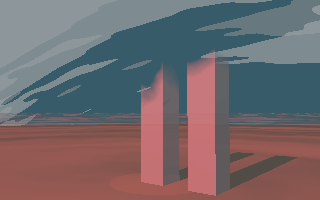
| First Reaction |
The first hint, for me, came when the Head of the Upper School ducked his head into my third-period class. "Assembly in the gym in ten minutes," Bill McQuade told me, and then was gone. Heaven help me, my first reaction was annoyance at the latest in a series of first-week disruptions to the schedule. I wondered what could merit an unannounced all-school assembly on the second day of classes. I had a foreboding, but now I recognize it as almost laughable. Theft? I wondered. Vandalism? Even violence between students? These concerns loomed so large at the time, a mountain range of dread and trouble. But now I see that these were the merest foothills and by day's end, we would be climbing the Rockies.
I first heard the news from my colleague and fellow Physics teacher, Ed Sabol. He had a student on a cell phone, frantically calling someone, but he took a moment to ask my reaction. To what? I wondered. And so he told me: A plane, or maybe two, had crashed into the Twin Towers, the World Trade Center. It was thought to be a terrorist action.
I can honestly recall the moment that the world changed. I mean that. I can recall the precise instant when everything rearranged itself in my head and I knew we had entered a new phase in history. I don't recall what I felt. I'm not sure I felt anything, at the moment. I went forward, numb. Or maybe not numb. I had that rush of adrenalized surreality. Some corner of me knew that the most important thing would be to keep moving, to head down the stairs, to join the assembly in the gym. I knew, somehow, that if I took the time to absorb the news, I would be stuck in that moment forever. Like some existential calculus problem I had to integrate past this singularity, this hole in history, and try to come out the other side.
I wish I could say that our headmaster was a voice of strength and comfort. I even wish I could say he wasn't. Truth be told, however, whatever he said washed over me. I have to believe I am not alone in this. There was no salve he could offer, no bridge he could lead us across, to get past the indredulity and horror. I remember thinking to myself, on three distinct occasions, that I could not get my head around this moment. It was, literally, unthinkable. I had to keep reminding myself of why we were gathered, what had transpired.
Then came the shock and the tragedy. Eventually all the images flooded in, an unfiltered backwash of all the human misery of the day. Eventually, I could discuss it with others at the dinner table or in the halls. I could begin to process it, to attempt to find order and meaning, though I know the search to be futile. Time started up again and, after only a few days, I wasn't stuck in that moment any more.
But the hole in history is still there. I can still feel the bump in the zeitgeist, the break in the collective train of thought. There's still a discontinuity. Things can make sense in this new world, as they made sense in the old. But reason cannot connect the two halves of our history; logic cannot paper over the boundary.
|
Voices In the Wilderness A Web-based Literary Journal (Voices Home) (ubidubium.net) |

| After the Fall of the Towers |